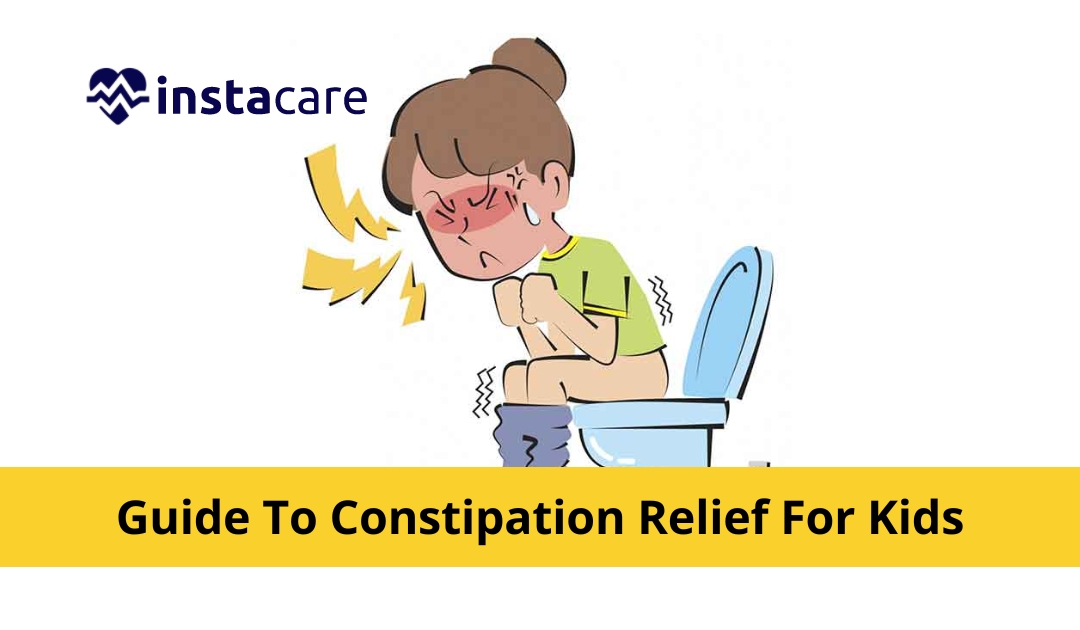Is your child experiencing constipation? Constipation in children can be painful, uncomfortable and inconvenient. But luckily, there are plenty of solutions to help provide them with relief. In this ultimate guide, we'll discuss the signs of constipation in kids and provide quick and long-term strategies to alleviate discomfort and get their digestive system functioning properly again. With our expert advice on tips like dietary changes, regular exercise schedules and lifestyle modifications – you’ll have all the information you need to make sure your kid is feeling better soon!
What constipation?
Constipation occurs when a person has difficulty passing stool or has infrequent bowel movements. The condition can be caused by a variety of factors such as lack of fiber in the diet, dehydration, ignoring the urge to have a bowel movement, or certain medications.
While constipation is common and usually not serious, it can be uncomfortable and lead to complications such as hemorrhoids or anal fissures. Maintaining a healthy diet, staying hydrated, and exercising regularly can help prevent constipation. If symptoms persist or worsen, it is important to consult a healthcare professional for proper diagnosis and treatment.
Constipation symptoms
Constipation is a common digestive problem that can lead to discomfort and even pain. It is characterized by infrequent bowel movements or difficulty passing stools. However, constipation can also present a variety of other symptoms such as bloating, stomach pain, and nausea. In severe cases, constipation may cause vomiting or even fainting. It is essential to pay attention to these symptoms, especially if they persist and affect your daily routine.
Understanding and recognizing constipation symptoms can help identify its causes, prevent future bouts, and manage any complications. If you experience any persistent digestive discomfort, seek medical advice to determine the best course of action and alleviate your symptoms.
Causes of constipation
Constipation can be uncomfortable, and even frustrating. It seems like everyone has experienced it at least once in their lives. While the exact causes of constipation can vary, there are a few common factors to consider. For instance, a lack of fiber in the diet can lead to irregular bowel movements. Not drinking enough water or other fluids can also cause constipation, as the body requires liquid for effective digestion.
Medical conditions such as irritable bowel syndrome (ibs) or hypothyroidism can also slow down bowel movements and result in constipation. In some cases, medications such as painkillers or antidepressants may have side effects that lead to constipation as well. It's important to stay aware of your own habits and to seek medical advice if constipation persists.
View More: Growth Problems In Children Everything You Need To Know
Prevention tips for constipation
Constipation can be a frustrating and uncomfortable experience, but it's often preventable with a few simple lifestyle changes. To avoid constipation, it's important to stay hydrated by drinking plenty of water throughout the day. Eating a diet rich in fiber, including fruits, vegetables, and whole grains, can also help keep things moving smoothly. Regular exercise can be beneficial too, as it stimulates the digestive system and helps keep the bowels regular.
It's also important to avoid certain constipation-triggering foods such as dairy products and low-fiber processed foods. Finally, make sure to schedule regular bathroom breaks to avoid delaying bowel movements. By incorporating these prevention tips into your daily routine, you can avoid the discomfort and frustration of constipation.
1- Dietary habits
If you're struggling with constipation, there are a number of healthy foods that you can try to help ease your discomfort. Foods that are high in fiber are key, as fiber can help your digestive system function properly and prevent constipation from occurring in the first place.
Some options to consider include fresh fruits and vegetables like apples, pears, broccoli, and carrots. Whole grains like oatmeal, brown rice, and quinoa are also excellent choices, as are legumes like black beans, lentils, and chickpeas. By incorporating these high-fiber foods into your diet, you can help keep your digestive system running smoothly and say goodbye to constipation once and for all.
2- Exercise routine
Constipation can be uncomfortable and even painful, but did you know that exercise can help relieve the symptoms? By implementing a regular exercise routine, you can encourage regular bowel movements and keep your digestive system functioning properly. Begin your routine with some light aerobic exercise like walking, jogging or cycling. This gets your heart rate up, improves blood flow and stimulates digestion.
Next, incorporate some abdominal exercises like crunches, leg raises and planks that work the muscles in your core. These will help strengthen the abdominal muscles which play an important role in bowel movements. Finally, end your routine with some stretches to help ease any tension and promote relaxation. With a regular exercise routine that focuses on aerobic exercise, abdominal exercises and stretching, you’ll be sure to experience some relief from constipation symptoms.
3- Remedies
As a parent, it can be tough to see your child struggling with constipation. Thankfully, there are several home remedies that can offer quick relief. One effective remedy is to increase fiber intake by adding more fruits, vegetables, and whole grains to your child's diet. Another solution is to encourage your child to stay hydrated by drinking plenty of water and avoiding sugary drinks. Physical activity can also help get things moving, so consider taking a family walk or encouraging your child to ride a bike.
Additionally, some natural supplements like probiotics and aloe vera juice can aid in digestion and alleviate constipation symptoms. No matter which remedy you choose, it's important to speak with your child's pediatrician first to ensure the remedy is safe for them to use.
4- Lifestyle changes
Maintaining regularity is an important aspect of a child's overall health and well-being. Parents can make a few lifestyle changes to ensure their kids stay regular. The first change is to increase water intake. Water plays a vital role in healthy digestion. Consuming enough fluids throughout the day helps keep bowel movements regular, reducing the likelihood of constipation. Secondly, increasing fiber intake through healthy and whole foods such as beans, whole grains, fresh fruits, and vegetables is a must.
Adding physical activity to their daily routine can help increase blood flow to the intestines, leading to regular bowel movements. Lastly, establishing a routine is crucial to regularity. Encourage kids to use the bathroom at the same time each day to promote healthy habits. By incorporating these lifestyle changes and making them a routine, parents can help ensure their kids stay healthy and regular.
Conclusion
Constipation can be an uncomfortable and embarrassing issue for children, but with the strategies outlined in this article, you can provide your child with the relief they deserve. Keeping up with dietary and lifestyle changes can maintain regular bowel movements and help prevent constipation from occurring. Incorporating more fiber-rich foods into your child's diet will also help with digestion and reduce straining during bowel movements.
Finally, be sure to consult with a doctor if any remedies don’t offer substantial relief for your child’s constipation—it’s important that the root cause of their condition is identified and treated. With basic lifestyle and dietary changes, it is possible to provide your children with lasting constipation relief.
If you want to consult with the best pediatrician in Pakistan, book an appointment through InstaCare or you can call helpline number 03171777509 for assistance to find the right professional for your concerns.











